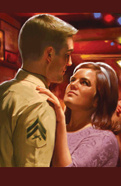Librettist Peter Duchan on the Many ‘Pinch Me’ Moments in Creating the New Musical Dogfight
About the Author:
As part of a creative team that includes Tony-winning director Joe Mantello and Tony-winning choreographer Christopher Gattelli, Peter Duchan is getting a crash course in musical theater as the book writer of Dogfight, a stage adaptation of Nancy Savoca's fondly remembered 1991 film. Duchan is known to indie cinema fans for his work on Breaking Upwards, a film he co-wrote with director Daryl Wein and actress Zoe-Lister Jones. His short film Unlocked, also a collaboration with Wein, appeared at Tribeca Film Festival, among others. Below, Duchan lets Broadway.com in on his longstanding love of musicals and why Dogfight, which opens on July 16 at Second Stage, is the perfect story for his first foray into the genre.
![]()
I’ve always loved musicals. My older brother and I used to torture our childhood babysitters by making them watch us lip-sync the entire Les Miserables recording. By age 10, I was trading the option of a birthday party for a family trip to see a Broadway show. My brain is clogged with useless trivia like, “Who won the Tony for Best Actress in a Musical in 1985?” (Trick question; they eliminated the category.) And, last year, three different people got me Sondheim’s memoir Finishing the Hat for Hanukkah.
Still, Dogfight is the first musical I’ve written. It’s not so easy finding the right story, passionate collaborators and producers willing to take a chance. But, four and half years after I first lent [the composing team of] Benj Pasek and Justin Paul the DVD of Nancy Savoca and Bob Comfort’s beautiful film—“Try to imagine it as a musical,” I implored—our show is about to have its world premiere at Second Stage Theatre. I’m often in a “pinch me” state of mind these days. I never expected our freshman effort would be produced on this scale. This is how I rationalize it…
Great Source Material: I’ll admit, the first time I watched the movie of Dogfight, I did so hoping it would strike me as ripe for musical adaptation. I didn’t get more than 10 minutes in before I was sold. I fell for the characters: idealistic, compassionate Rose Fenny and lost, careless Eddie Birdlace. I could envision immediately how it could translate to the stage, what a great foundation the movie would provide for a musical, how we might take advantage of the scope and speed of a musical to tell this heartfelt story. Throughout the writing process, when stuck, we would re-watch the movie, often noticing something in it we’d previously missed. We even got to have breakfast with Lili Taylor, who generously offered to answer our many questions about the making of the film and the development of the character of Rose.
Trust Your Collaborators: Before the very first Dogfight workshop, my friend Sheryl Kaller, who directed Next Fall, gave me some terrific advice. As the book writer, she said, it would behoove me to always remain in “a Yes space.” That doesn’t necessarily mean, “Yes, whatever you say goes,” but it does mean, “Yes, I’ll try.” Musical theater is a highly collaborative medium, integrating so many elements, some of which can only be discussed in the abstract until tech rehearsals begin. Learning to write a musical means discovering that, sometimes, a few measures of underscoring or even a light cue can be more helpful to the storytelling than any written dialogue. A musical requires rigorous collaboration. I’ve been very lucky to roll up my sleeves alongside smart and talented folks like Benj and Justin, Chris Gattelli, and—pinch me—Joe Mantello.
Just Tell the Story: The night of our first preview, I gave myself a pep talk. I told myself, as long as we engage the audience, as long as they invest in the story, as long as they get on the ride—then I’ve done my job. Our story isn’t necessarily the conventional boy-meets-girl narrative. It starts big but gets increasingly smaller in focus, propelled by shifts in attitude and behavior, by the characters’ capacity for change. At times during the writing process we’ve thought, wouldn’t it be great to have a big production number late in Act Two? Where’s “I’m a Brass Band,” “Razzle Dazzle” or the sinking of the Titanic? But that doesn’t fit into our story. Dogfight is about two ordinary people and the effect they each have on the other over the course of one bumpy night in 1963. Instead of running from it or trying to camouflage it, we had to embrace what makes this story special. Our job is to tell this particular story, trust it, and get out of its way.
I’m currently at work on two new musicals, two new collaborations. I often catch myself applying what I’ve learned from the experience of crafting Dogfight. It’s been an exhilarating, seemingly charmed process. And now I can say I love musicals almost as much as I love writing them.
